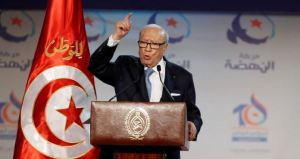 In Agust 2017 Tunisian President Beji Caed Esibsi called on the country’s Prime Minister and Minister of Justice to make changes to legislation that bans Muslim Tunisian women from marrying non-Muslim men. Essibsi’s statement was made during a speech on the occasion of Tunisia’s national women’s day.
In Agust 2017 Tunisian President Beji Caed Esibsi called on the country’s Prime Minister and Minister of Justice to make changes to legislation that bans Muslim Tunisian women from marrying non-Muslim men. Essibsi’s statement was made during a speech on the occasion of Tunisia’s national women’s day.
Esibsi noted that he believes banning Muslim women from marrying non-Muslim men is unconstitutional because the sixth chapter of the Constitution guarantees freedom of belief and conscience for all Tunisians.
The marriage ban in Tunisia was being enforced on the basis of Publication 73, released by the Ministry of Justice in 1973. According to Publication 73 women cannot marry foreigners if the Islamic faith of the foreigner hasn’t been recognized by a Mufti.
It’s worth noting that this Publication 73 is currently enforced by so-called “moderate Muslims” in the country and that this only will change after the newly adopted decision to abolish the ban has been implemented. It’s worth mentioning this because – as one will see below – one can expect considerable resistance and foot dragging from the side of Imams and religious communities.
Essebsi’s initiative was “revolutionary” in as much as even most “moderate” Islamic scholars would agree that Muslim women should not be allowed to marry non-Muslim men. Moreover, converting to another religion is considered apostasy – and even many “moderate Muslim human rights activists” would argue that the punishment for that ought to be death.
However, Essibsi was swimming against the “moderately ultra-conservative current” when he argued that Tunisian law no longer should hinder Tunisian women from freely choosing their partners. But, Esibsi was not merely acting contrary to Tunisian Muslim orthodoxy.
After changes to Publication 73 Tunisia is now the first Muslim majority country to allow all women to marry men from different faith.

Tunisia – as unbelievable as it may sound a very “progressive” Muslim majority country with regard to women’s rights. (archives)
Before the change to the law, several Muslim women got married to men from different faiths already. However, these civil marriages lack recognition on the same level as “Mufti-approved” marriages.
Several groups, including groups representing “moderate Muslims” view Publication 73 as consistent and the proposed changes to Publication 73 as violation of the fundamental rules of Islamic religion. Others perceive the proposed legislation as progressive and a victory for freedom.
During his speech at the occasion of Women’s Day 2017 in August, the President stressed that his country also wants to establish equality between men and women in terms of inheritance.
Essebsi promised to form a committee to study the matter. Essebsi said that Islam doesn’t contradict with development and democracy, and the inheritance issue was left to the diligence of people based on the era they are living in.
“Moderate” Al-Azar blasts Tunisian decision
How much Essebsi has to swim against the current of even the most “recognized” and allegedly “moderate” Islamic institutions is readily demonstrated by a statement made by Al-Azhar Grand Imam Ahmed Al-Tayeb – Note that Egypt-based Al-Azhar is internationally recognized as the most authoritative, allegedly “moderate” institution of Sunni Islam.
During his speeches Al-Tayeb claimed that marriage in Islam is not a civil contract but rather a religious bond that is based on love and cordiality.
Al-Tayeb tried to justify differences between the status of men and women claiming that “a Muslim man can marry a Christian woman because his faith is only intact when he believes in Jesus”. Hence, he will allow her to go to church and to freely exercise her religion, Al-Tayeb claimed.
Conversely, Al-Tayeb claimed that “a Christian man doesn’t believe in the faith of a Muslim woman, so cordiality in this marriage will be absent and this is why it was banned by Islam”.
The “moderate” Al-Azhar Grand Imam did not explain the foundation of his implied position that Islam – or any other religion – should have an impact on civil legal affairs which are regulated by law. Moderate Al-Azar does, although moderately carefully, support the introduction of sharia law, also in non-Muslim majority countries.
A/N & CH/L – nsnbc 17.09.2017
Source Article from https://nsnbc.me/2017/09/17/tunisia-overturned-law-that-prohibited-tunisian-muslim-women-from-marrying-non-muslims/
Related posts:
Views: 0
 RSS Feed
RSS Feed

















 September 18th, 2017
September 18th, 2017  Awake Goy
Awake Goy 
 Posted in
Posted in  Tags:
Tags: 
















